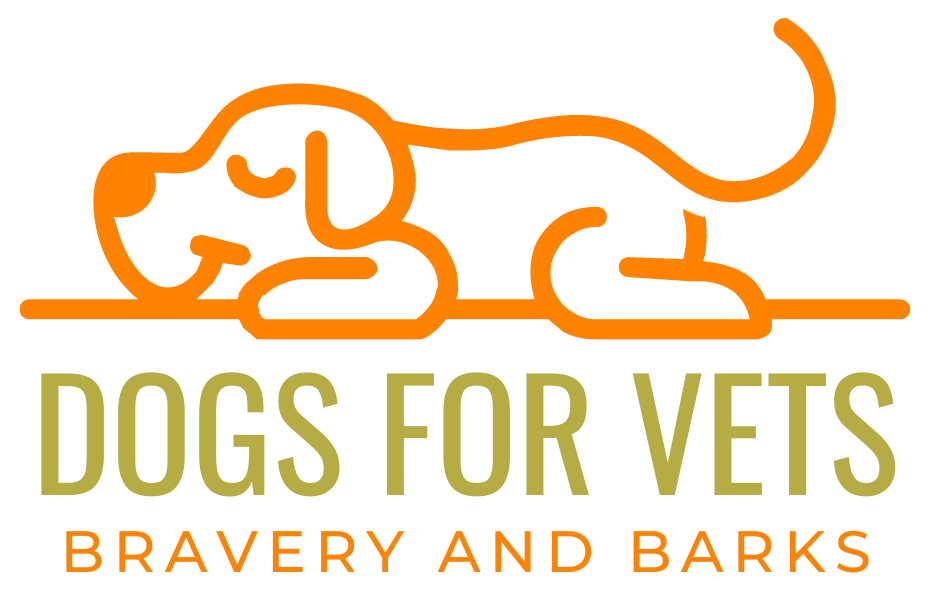This post may contain ads and affiliate links and we may earn a small commission when you click on the links at no additional cost to you. As an Amazon Affiliate, we earn from qualifying purchases. You can read our full disclaimer here.
Golden Retriever Aging Guide to Enrich Your Dog’s Senior Years

Golden Retriever aging is a tender phase. It’s a mix of loyalty, love, and little shifts in daily life.
Our Goldens age gracefully, subtly. A slower step here, a longer nap there. We see these gentle signs and understand—time is passing.
We bond deeply with these companions. My Golden Retriever, Daisy, at 11, is more than a pet; she’s a cherished member of the family. Each day with her is a gift, a reminder to savor every moment.
Helping our Goldens through their senior years means adapting. We keep an eye on their health, tweak their diets, and ensure their beds are cozy. Our care helps them stay comfortable.
Their love remains strong, undiminished by age. They may chase fewer balls, yet their eyes still speak volumes of their affection.
Understanding Golden Retriever Aging
Golden Retriever aging begins subtly. This breed typically enjoys a life span of 10 to 12 years. But what does getting older mean for them?
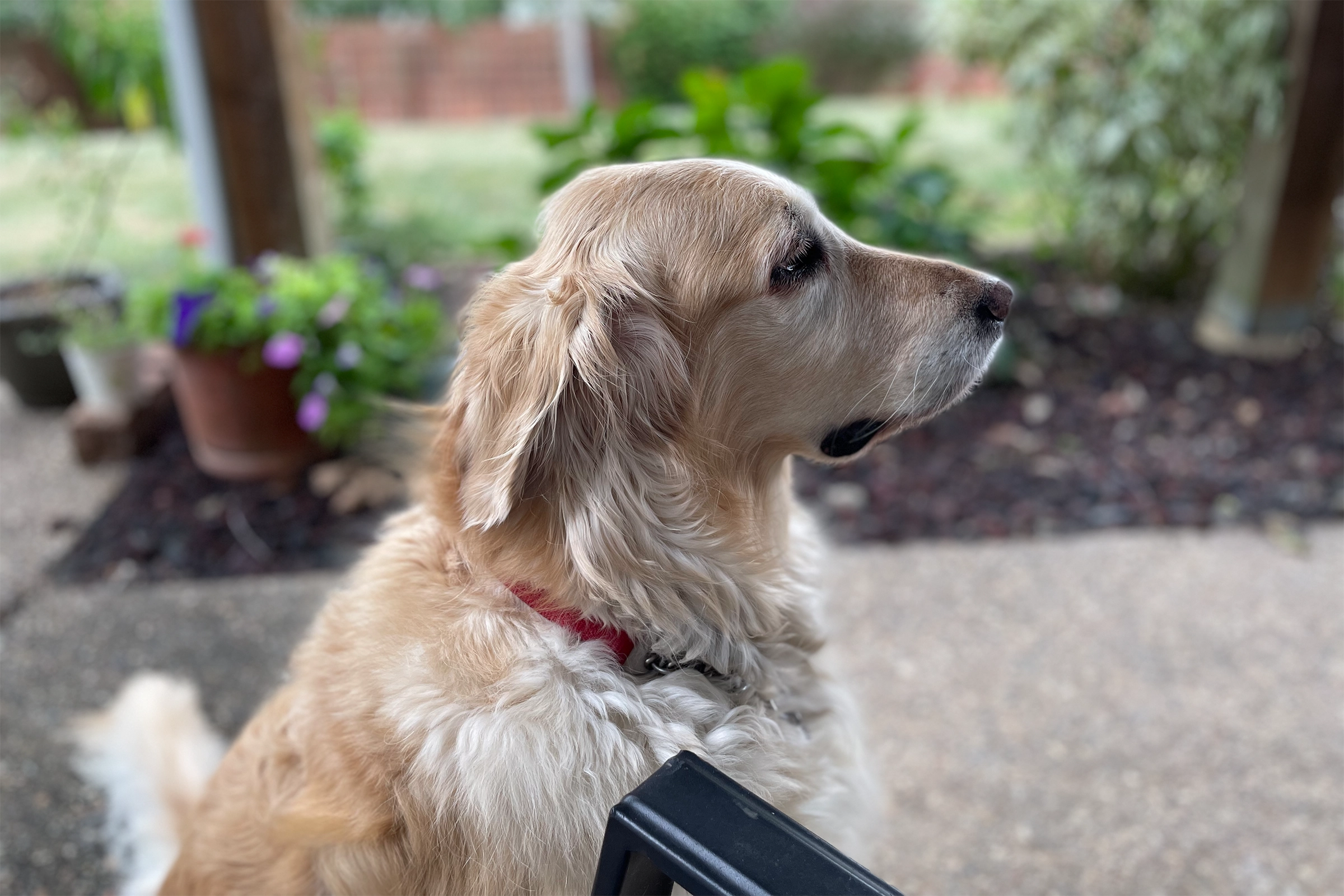
Life Expectancy of Golden Retrievers
Firstly, let’s talk life expectancy. Golden Retrievers live, on average, about a decade or more. Some may live longer, others shorter. Genetics, health, and environment all play roles.
Recognizing Aging Symptoms
As Golden Retrievers age, they show certain symptoms. It’s important to spot these. Here’s what to look for:
- Graying Muzzle: Like humans, Goldens go gray. Look for lighter fur around their face.
- Coat Changes: Their once-thick fur may thin. It might lose some of its shine.
- Slowing Down: Your energetic buddy might start to take it easy. Less running, more strolling.
- Activity Level Shifts: They’ll likely sleep more. They might hesitate before jumping or climbing.
- Behavioral Shifts: Mood changes can occur. They may seek more affection. Or they might want more alone time.
Identifying these changes helps you understand their needs. And it shows you what to expect in the years to come. Remember, these signs are normal. They’re a part of your Golden’s natural aging process.
Read our post about when Golden Retrievers calm down.
The Emotional Tapestry of Golden Retriever Aging
Golden Retriever aging is a heartfelt experience. It brings lessons in love and the reality of life’s fleeting nature. In my journey with Penny and Lucky, I gathered countless moments that are now precious memories.
Cherished Memories with Penny and Lucky
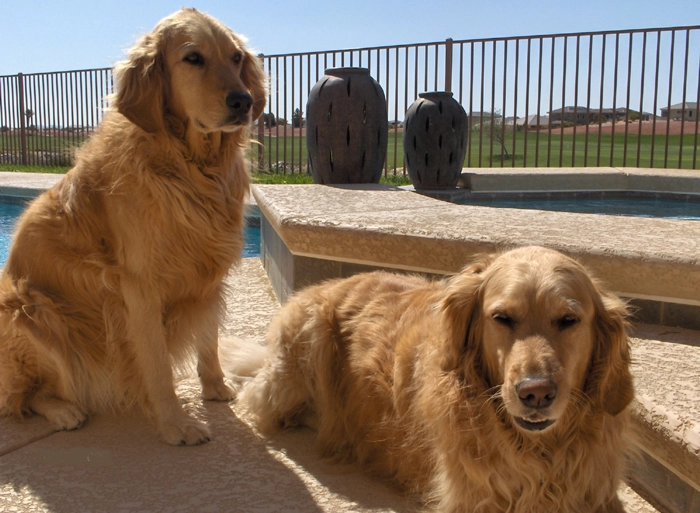
Penny was a beacon of youth, her eyes always sparkling with mischief. Her six years with us were a whirlwind of joyous barks and endless games of fetch.
From her, I learned to cherish the now, as tomorrow is never promised.
Lucky’s eight years felt like a brief sunset, stunning yet achingly short. His love for life was a daily lesson in enthusiasm and living in the moment.
Navigating the Emotional Shifts
As we observe our Golden Retrievers grow older, the emotional landscape shifts:
- Acceptance: Understanding that aging is a natural process is crucial.
- Appreciation: We learn to value every quiet companionable silence, each gentle nudge.
- Adaptation: Adjusting our routine and expectations as they age is part of the journey.
Golden Retriever’s Lifespan Spectrum
Golden Retrievers, like people, have varied lifespans. Reflecting on the 15 years my daughter-in-law’s Golden graced their lives, I consider the factors that contribute to such a rich lifespan:
- Genetics: Some Goldens are predisposed to a longer life.
- Care: A balanced diet, regular exercise, and preventive veterinary care can extend their years.
- Environment: A safe, loving home is the foundation for a flourishing life.
Golden Retriever aging is a process filled with emotional depth and opportunity for growth. It teaches us to be present, to love fiercely, and to provide the care and affection that these beautiful creatures deserve throughout their golden years.
Practical Care Tips for Aging Golden Retrievers
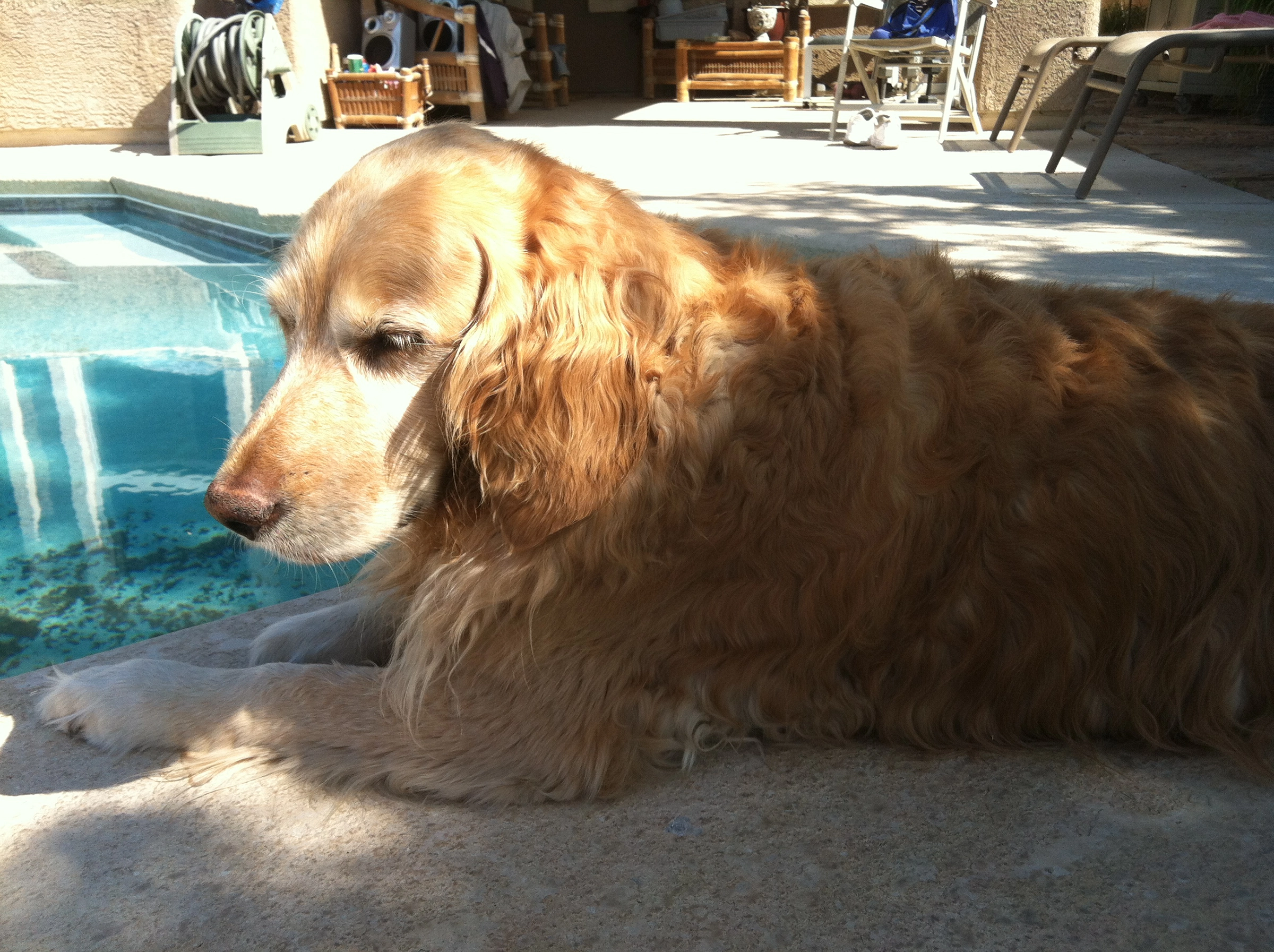
Golden Retriever aging necessitates a shift in how we care for our furry companions. As they enter their senior years, the focus should be on maintaining their quality of life with nuanced care strategies.
Nutritional Adjustments for Senior Goldens
The right diet for an aging Golden can work wonders. Let’s break it down:
- High-Quality Protein: Older dogs need protein to maintain muscle mass, but it must be easy to digest. Think cooked eggs, lean chicken, or fish.
- Calorie Control: Less active dogs need fewer calories. Avoid weight gain by measuring food and cutting back gradually.
- Fatty Acids: Supplements with Omega-3, like fish oil, can support joint health and keep their coat shiny.
- Fiber for Digestion: A balanced amount of fiber helps keep their digestive system moving. Pumpkin or specially formulated senior dog food can help.
Exercise for the Aging Golden
Keep them moving, but be mindful of their limits:
- Daily Walks: Aim for two shorter walks a day instead of one long trek.
- Swimming: This non-weight-bearing exercise is excellent for sore joints.
- Stretching: Gentle daily stretches can help maintain flexibility. Consult your vet for proper techniques.
Creating a Comfortable Living Space
Their home environment should cater to their comfort:
- Orthopedic Beds: These beds support aging joints and can prevent bedsores.
- Ramps and Steps: These aid dogs who can no longer jump onto the couch or bed.
- Temperature Control: Older dogs may struggle with temperature regulation. Keep their bed away from drafts and consider a warm coat for chilly days.
Mental Health and Cognitive Care
Keep their minds as active as their bodies:
- Problem-Solving Toys: Interactive toys that challenge them to solve puzzles for treats can keep their brain sharp.
- Ongoing Training: Teaching new, simple tricks can stimulate their thinking and reinforce your bond.
- Socializing: Interactions with other pets and people can boost their spirits and keep them mentally engaged.
Attending to these aspects of Golden Retriever aging will help ensure your dog stays as healthy and happy as possible in their later years.
Quality of Life for Golden Retriever Aging
The golden years of a Golden Retriever’s life are a time for gentle care and deep bonding.
Quality of life during this stage is a holistic measure that encompasses their physical comfort, emotional well-being, and the joy they find in everyday activities.
Assessing and enhancing the quality of life for an aging Golden means paying close attention to their needs and responses as they navigate this phase of life.
Mobility and Comfort
As Golden Retrievers age, their mobility naturally declines, but they should still be able to move with minimal discomfort. Observing your dog as they go about their daily activities is crucial.
Signs of discomfort, such as hesitation when getting up or reluctance to climb stairs, can indicate that it’s time to consult with a veterinarian. To support their mobility and comfort:
- Maintain a regular, gentle exercise regimen
- Offer orthopedic bedding to ease joint pain
- Keep their living space easily navigable, free of obstacles
Healthy Appetite and Digestion
A senior Golden’s eating habits offer insights into their health. Changes in appetite or digestion may point to the need for dietary adjustments. For optimal health and digestion:
- Provide specially formulated senior dog food
- Monitor their weight and adjust portions as necessary
- Ensure fresh water is always available
Hygiene and Grooming
Hygiene can become a challenge for an older dog, and they may need assistance in maintaining their cleanliness. Regular grooming has multiple benefits:
- It’s an opportunity to monitor their skin health
- It helps prevent mats and skin infections
- It’s a way to strengthen your bond through physical care
Emotional Well-being and Engagement
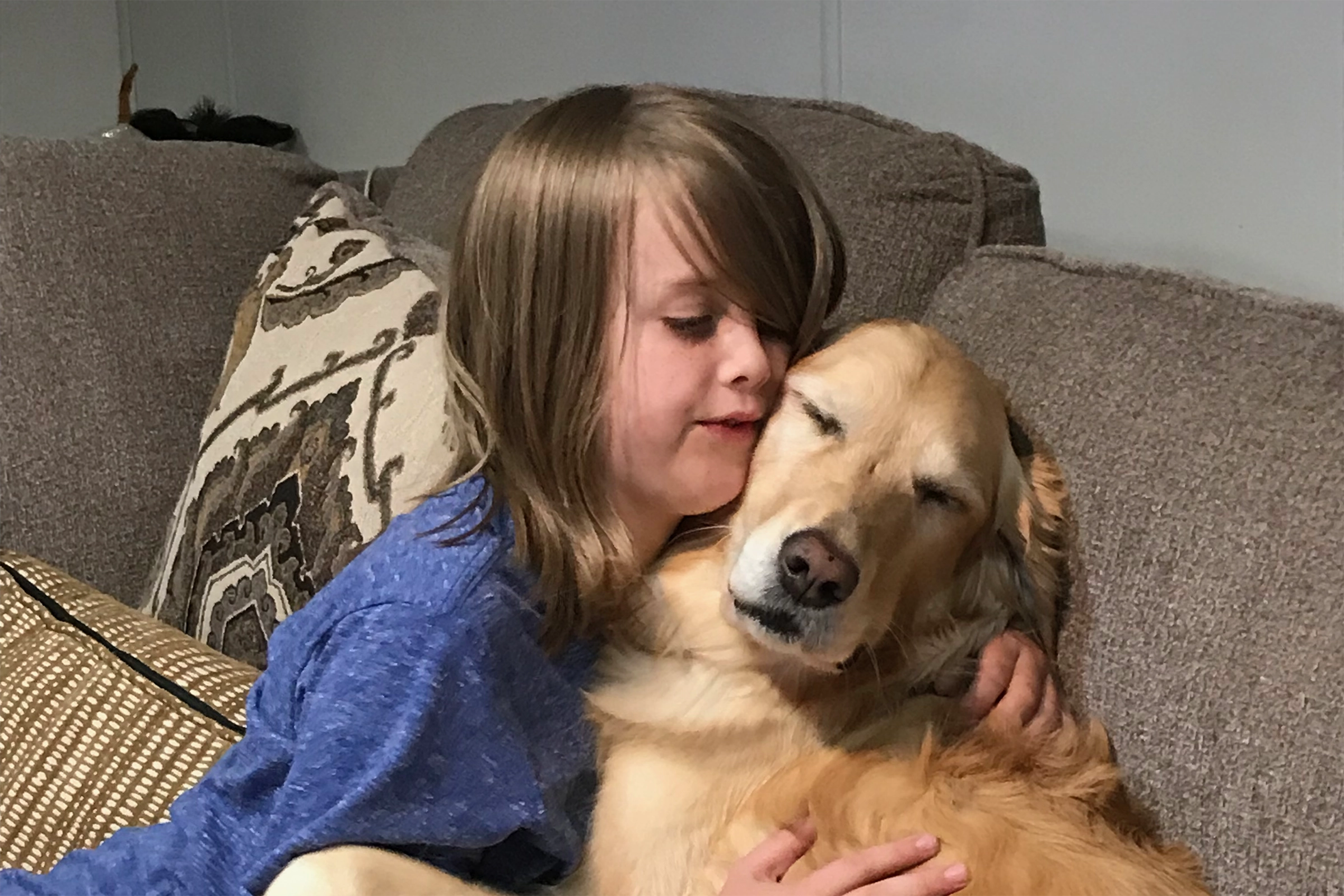
An older Golden Retriever might show less overt enthusiasm but should still enjoy interaction and stimulation. To gauge and enhance their emotional well-being:
- Watch for signs of interest in play and interaction
- Offer affection and companionship daily
- Provide mentally stimulating toys and activities
The Importance of Routine and Companionship
Aging dogs thrive on routine and companionship, which provide them with structure and emotional support. As they experience changes in their capabilities, having a predictable schedule and a loving presence becomes invaluable.
Creating a Stable Environment
Stability and structure are comforting for senior dogs, and a consistent routine helps them feel secure. Consider these elements for a stable routine:
- Set regular times for meals, walks, and bedtime
- Keep their living area consistent and comfortable
- Establish a routine for grooming and hygiene care
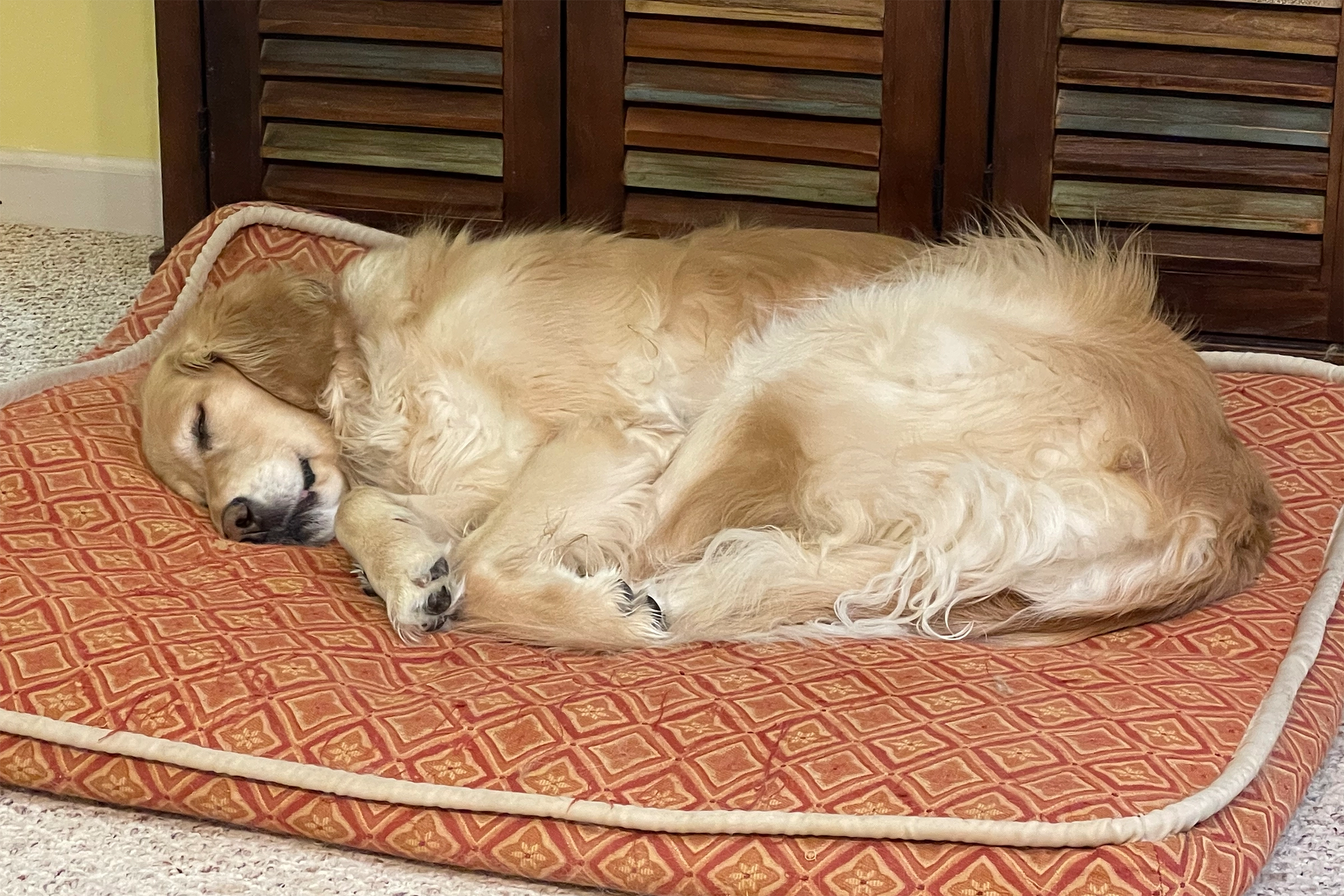
The Value of Your Presence
For a senior Golden, your company is one of their greatest comforts. To be there for your dog means more than just physical presence:
- Spend time sitting or lying down next to them
- Engage in quiet, calm petting sessions
- Simply be in the same room, offering a reassuring voice or touch
Enriching Activities for Senior Goldens
Senior Goldens may not have the same energy levels as in their youth, but they still relish opportunities to engage and bond. Tailoring activities to their pace ensures they continue to enjoy life.
Learn more at our post about activities for senior dogs.
Tailored Play and Interaction
Older dogs appreciate gentle, shorter play sessions that don’t tax their energy or joints. To keep your senior Golden engaged:
- Offer soft toys for gentle play
- Initiate short, low-impact games
- Enjoy quiet companionship without the need for activity
Therapeutic Physical Contact
Physical contact like petting and massage can have therapeutic effects on an aging dog. These sessions can:
- Alleviate joint stiffness
- Improve circulation
- Provide relaxation and comfort
Cognitive Engagement
Mental stimulation is as crucial as physical activity. Keeping your Golden’s mind sharp can be as simple as:
- Introducing new, simple commands
- Providing treat-dispensing toys
- Encouraging them to use their senses for gentle exploration
By embracing these practices and integrating them into the daily life of your aging Golden Retriever, you can help ensure their later years are filled with comfort, love, and contentment.
The Prevalence of Cancer in Aging Golden Retrievers
Golden Retrievers are known not only for their friendly and loyal nature but unfortunately also for their predisposition to cancer. As they age, the risk of developing cancer increases significantly.
Golden Retrievers consistently rank among the most beloved dog breeds, yet they face a significant health challenge. UC Davis states that as many as 65% of Golden Retrievers may succumb to various forms of cancer, marking a startling statistic for these cherished canine companions.
Being aware of this risk is crucial for early detection and management, which can greatly affect the quality of life and potential outcomes for your beloved pet.
Recognizing the Signs of Cancer
Early detection can often be the key to more effective treatment when it comes to cancer. Owners should be vigilant for symptoms that could indicate the presence of cancer, such as:
- Unexplained weight loss or loss of appetite
- Persistent lethargy or loss of interest in activities
- Lumps or bumps on the skin that change in size or appearance
- Sores that do not heal
- Difficulty breathing, urinating, or defecating
It’s important to conduct regular at-home checks for any physical changes in your dog and to stay consistent with veterinary check-ups.
A proactive approach allows for early intervention should anything unusual be detected.
Helping Your Golden Retriever Aging
If your Golden Retriever is diagnosed with cancer, there are ways you can help them cope with the illness and its treatment:
Veterinary Care: Collaborate closely with your veterinarian to understand the options available, which might include surgery, chemotherapy, or radiation. Sometimes, palliative care is the most humane option, focusing on comfort rather than cure.
Nutritional Support: Consult with a vet about specialized diets that support dogs undergoing cancer treatment. Proper nutrition is vital for maintaining strength.
Pain Management: Stay attuned to signs of pain in your dog. Pain management, which may include medications, acupuncture, or other therapies, can significantly improve quality of life.
Emotional Support: Just like humans, dogs can sense stress and anxiety. Offer your Golden extra love and comfort through this challenging time. A stable and peaceful home environment can be very soothing for them.
Environmental Comfort: Make sure your dog’s resting area is quiet, warm, and comfortable. Dogs undergoing cancer treatment may require extra bedding, warmth, or even a change in location to be closer to the family.
Regular Monitoring: Keep a close eye on your dog’s behavior and physical condition. Regular monitoring can help catch any changes early, allowing for timely adjustments to treatment plans.
Supporting Your Companion
Facing cancer in a Golden Retriever is a difficult journey that no pet owner wants to experience. However, with attentive care, an understanding of the signs, and prompt veterinary intervention, you can help manage your dog’s condition.
While some aspects of cancer may be beyond your control, providing a nurturing and supportive environment can make a world of difference in your Golden Retriever’s well-being as they age.
Golden Retriever Aging: Tackling Weight Gain
Golden Retriever aging comes with various changes, including a tendency for weight gain. As they enter their senior years, maintaining a healthy weight becomes crucial for their well-being.
Understanding the Impact of Excess Weight
Excess weight on an older Golden can significantly affect their health. It increases the risk of:
- Arthritis, stressing their joints.
- Diabetes, a serious metabolic condition.
- Heart disease, which can shorten their lifespan.
These risks highlight why monitoring their weight is a key aspect of caring for an aging Golden Retriever.
Tailoring Your Golden’s Diet
As metabolism slows, your Golden’s diet needs to change. Here’s how to start:
- Choose Senior-Specific Food: Foods formulated for senior dogs have fewer calories and more nutrients tailored for aging bodies.
- Measure Meals: Use a measuring cup to serve the exact amount recommended for your dog’s ideal weight.
- Opt for Healthy Treats: Treats should be low in calories and high in nutrients. Carrot sticks or apple slices can be great alternatives to processed treats.
Consulting a veterinarian can provide a diet plan that’s perfect for your Golden’s age and lifestyle.
Promoting Exercise for Your Senior Dog
Exercise remains important as your Golden Retriever ages. It helps with:
- Weight control
- Muscle maintenance
- Mental health
Even with lower energy levels, Goldens still enjoy gentle activities such as:
- Short Walks: Frequent, brief walks are better than occasional long ones.
- Swim Sessions: Swimming offers exercise without straining the joints.
- Interactive Toys: Puzzle toys can keep them mentally and physically engaged.
Adapt exercise routines to your dog’s endurance and comfort levels, always ready to modify as needed.
The Role of Veterinary Support
Routine veterinary care plays a vital role in managing weight gain during Golden Retriever aging. Your vet can help by:
- Regularly assessing your dog’s weight and body condition.
- Offering professional advice on diet adjustments.
- Identifying and managing any weight-related health conditions.
With a proactive approach and support from your vet, you can help your senior Golden Retriever avoid the pitfalls of weight gain and stay as healthy and happy as possible during their golden years.
Dental Care for Older Golden Retrievers
Golden Retriever aging brings dental care to the forefront of their health regimen. As they age, dental hygiene becomes crucial to prevent disease and maintain overall well-being.
Importance of Dental Health
Good oral hygiene is a cornerstone of health for senior Goldens. Tooth decay and gum disease can lead to more serious health issues, including infections that can spread to vital organs.
Daily Brushing
Start with daily brushing. Use a toothbrush designed for dogs and pet-safe toothpaste. Regular brushing prevents tartar buildup and gum disease, keeping your Golden’s mouth healthy.
Chew Toys and Dental Treats
Chew toys aren’t just for fun; they help clean teeth too. Dental treats can reduce plaque and freshen breath, acting as a supplement to brushing.
Professional Cleanings
Professional dental cleanings by a veterinarian should be part of your dog’s health routine. These cleanings remove plaque and tartar that brushing can’t.
Recognizing Dental Issues
Watch for signs of dental problems:
- Bad breath
- Difficulty eating
- Pawing at the mouth
- Discolored teeth
- Bleeding gums
Spotting these early can lead to quicker treatments and less discomfort for your Golden.
Fresh Water and Diet
Always provide fresh water to help rinse away food particles. A healthy diet contributes to strong teeth and gums, supporting dental health as part of a holistic approach to Golden Retriever aging.
By incorporating these dental care practices into your Golden’s routine, you can help ensure their golden years are accompanied by a healthy smile.
20 Essential (and Quick) Tips for Supporting Your Aging Golden Retriever
- Regular Vet Check-ups: Schedule bi-annual visits for early detection of age-related issues.
- Balanced Diet: Feed them age-appropriate, nutrient-rich food to support their health.
- Weight Management: Keep them at a healthy weight to reduce joint stress.
- Dental Care: Maintain oral hygiene to prevent dental diseases that can affect overall health.
- Gentle Exercise: Incorporate low-impact exercises like walking or swimming into their routine.
- Mental Stimulation: Use puzzle toys and training exercises to keep their mind sharp.
- Joint Supplements: Consider adding glucosamine or chondroitin to support joint health.
- Comfortable Bedding: Provide orthopedic beds to ease pressure on aging joints.
- Regular Grooming: Keep their coat and skin healthy with regular brushing and grooming.
- Accessibility Aids: Use ramps or steps to help them access furniture or vehicles.
- Pain Management: Work with your vet to manage any pain with appropriate medications or therapies.
- Frequent Potty Breaks: Allow more frequent bathroom breaks as their bladder control may diminish.
- Social Interaction: Continue to socialize them with people and other dogs to keep their spirits high.
- Routine: Maintain a consistent daily routine to provide them with a sense of security.
- Temperature Control: Ensure they stay warm in the winter and cool in the summer.
- Regular Monitoring: Keep an eye on any changes in behavior or health and report to your vet.
- Love and Affection: Provide plenty of cuddles, pets, and quality time to show they’re loved.
- Preventive Care: Stay up to date with vaccinations and parasite prevention as recommended by your vet.
- Adapt Playtime: Modify play to accommodate their aging body, avoiding high-impact activities.
- Cancer Screening: Given their high risk, talk to your vet about regular screenings for early detection of cancer.
Final Thoughts on Golden Retriever Aging
As our Golden Retrievers age, their needs change, and it’s up to us to make sure they’re happy and comfortable. We’ve talked about lots of ways to help them, like feeding them right, keeping them moving, and looking after their teeth. It’s all about giving them the best life possible as they get older.
But more than anything, what they really need is our love. No matter how old they get, our Goldens still look to us for warmth and care. So let’s make sure we enjoy every single moment with them, fill their days with joy, and give them the gentle care they deserve.
Helping our Goldens grow old gracefully is a special job. Let’s do it with kindness and make sure they know they’re loved, every single day.
-
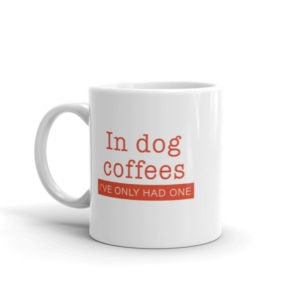
Coffee Mug – In Dog Coffees I’ve Only Had One
$11.95 – $14.95 Select options This product has multiple variants. The options may be chosen on the product page
